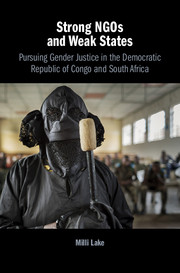Crossref Citations
This Book has been
cited by the following publications. This list is generated based on data provided by Crossref.
Loken, Meredith
Lake, Milli
and
Cronin-Furman, Kate
2018.
Deploying Justice: Strategic Accountability for Wartime Sexual Violence.
International Studies Quarterly,
Vol. 62,
Issue. 4,
p.
751.
Laudati, Ann
and
Mertens, Charlotte
2019.
Resources and Rape: Congo’s (toxic) Discursive Complex.
African Studies Review,
Vol. 62,
Issue. 4,
p.
57.
Lazarev, Egor
2019.
Laws in Conflict: Legacies of War, Gender, and Legal Pluralism in Chechnya.
World Politics,
Vol. 71,
Issue. 04,
p.
667.
Wael, Reem
2019.
Negotiating the Power of NGOs.
De Vos, Christian M.
2020.
Complementarity, Catalysts, Compliance.
GÜZEL, Bekir
2020.
TÜRKİYE’DEKİ SOSYAL HİZMET UZMANLARININ TOPLUMSAL CİNSİYET ALGISININ BELİRLENMESİ.
Tıbbi Sosyal Hizmet Dergisi,
Vol. 0,
Issue. 16,
p.
82.
Wolff, Stefan
2021.
Enhancing the Robustness of Causal Claims Based on Case Study Research on Conflict Zones: Observations from Fieldwork in Donbas.
Nationalities Papers,
Vol. 49,
Issue. 3,
p.
542.
Morse, Jaimie
2021.
The Geopolitics of “Rape Kit” Protocols.
Osiris,
Vol. 36,
Issue. ,
p.
200.
Kostovicova, Denisa
and
Paskhalis, Tom
2021.
Gender, Justice and Deliberation: Why Women Don't Influence Peacemaking.
International Studies Quarterly,
Vol. 65,
Issue. 2,
p.
263.
Nordås, Ragnhild
and
Cohen, Dara Kay
2021.
Conflict-Related Sexual Violence.
Annual Review of Political Science,
Vol. 24,
Issue. 1,
p.
193.
Berry, Marie E.
and
Lake, Milli
2021.
Women's Rights After War: On Gender Interventions and Enduring Hierarchies.
Annual Review of Law and Social Science,
Vol. 17,
Issue. 1,
p.
459.
Dunn, Holly
2021.
Emergent Hybrid Legality: A Study of Legal Encounters in the DRC.
Journal of Intervention and Statebuilding,
Vol. 15,
Issue. 2,
p.
201.
Gjerløw, Haakon
Karim, Sabrina
and
Østby, Gudrun
2021.
When Governments and International Organizations Shut Down: The Impact of COVID-19 on Refugees’ and Host Community’s Use of Educational Services in Cox’s Bazar.
Frontiers in Education,
Vol. 6,
Issue. ,
Sahin, Bilge
2021.
Mobile hearings in the Eastern DRC: prosecuting international crimes and implementing complementarity at national level.
Journal of Eastern African Studies,
Vol. 15,
Issue. 2,
p.
297.
Loken, Meredith
and
Hagen, Jamie J
2022.
Queering Gender-Based Violence Scholarship: An Integrated Research Agenda.
International Studies Review,
Vol. 24,
Issue. 4,
Stroup, Sarah S
2022.
NGOs and States: Exploring National Diversity and Global Liberalism.
International Studies Review,
Vol. 24,
Issue. 1,
Berry, Marie E.
2022.
Radicalising resilience: mothering, solidarity, and interdependence among women survivors of war.
Journal of International Relations and Development,
Vol. 25,
Issue. 4,
p.
946.
Ariotti, Margaret
Dietrich, Simone
and
Wright, Joseph
2022.
Foreign aid and judicial autonomy.
The Review of International Organizations,
Vol. 17,
Issue. 4,
p.
691.
Tøraasen, Marianne
2023.
Women's Judicial Representation in Haiti: Unintended Gains of State-Building Efforts.
Politics & Gender,
Vol. 19,
Issue. 1,
p.
34.
Christensen, Mikkel Jarle
2023.
Justice Sites and the Fight against Atrocity Crimes.
Law & Social Inquiry,
Vol. 48,
Issue. 4,
p.
1399.





